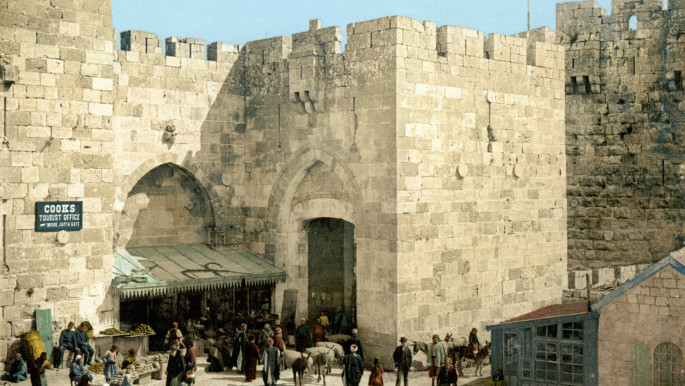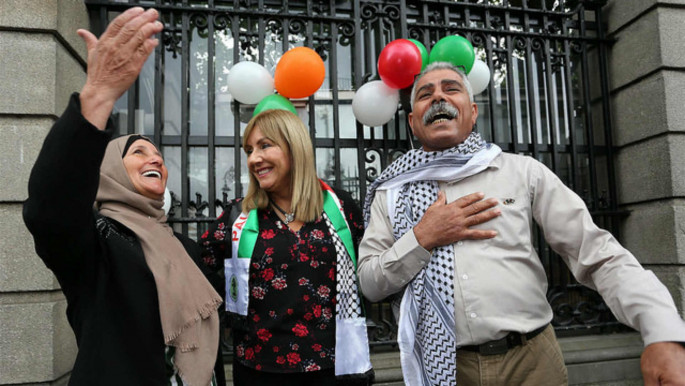How Ireland is quietly becoming one of the Middle East's diplomatic heavyweights
While several countries in Western Europe have centuries-old ties to the Middle East, few realise that this list includes Ireland.
Just last year, Pádraig Ó Macháin, a historian at University College Cork, discovered a fifteenth-century Irish translation of a medical textbook by the medieval Persian polymath Ibn Sina.
Academics have also speculated that the famed Irish philosopher William Molyneux's 1688 thought experiment, termed "Molyneux's problem," took inspiration from the writings of the twelfth-century Arab intellectual Ibn Tufail.
In more recent years, Ireland has worked to forge a closer relationship with the Middle East in areas from bilateral trade to international security. According to the Arab–Irish Chamber of Commerce (AICC), a Beirut-based advocacy group, Ireland did €2.2 billion ($2.6 billion) in business with twenty Arab countries in 2016.
The AICC has also noted that Saudi Arabia represents the third-largest destination for Irish agricultural exports outside the European Union (EU).
In the realm of global security, Ireland has put considerable resources toward the promotion of conflict resolution in the Middle East. The Irish Defence Forces have participated in the United Nations Disengagement Observer Force in Syria and the UN Interim Force in Lebanon, and the island country spent €11 million ($13 million) on humanitarian aid for Palestine, €25.5 million ($30 million) for Syria, and €8 million ($9.5) for Yemen in 2017 alone.
 |
Ireland's lack of a colonial legacy has enabled it to form connections with countries hostile to the objectives of Western world powers |  |
Ireland has also financed the work of the International Committee of the Red Cross (ICRC) in Libya amid the North African country's civil war.
In part, Ireland's history may inform the island country's outreach to the Middle East. Having fought a war of independence against the British Empire just a hundred years ago, Ireland has much in common with Middle Eastern and North African countries that know the costs of colonialism all too well.
 |
|
| Read more: homas Cook: Tourism and the rise of Britain's empire in the Middle East |
France and the United Kingdom, on the other hand, are still wrestling with the consequences of Europe's imperial past as they attempt to engage with the region.
Ireland's lack of a colonial legacy has enabled it to form connections with countries hostile to the objectives of Western world powers. In 2018, a top Irish lawmaker visited Iran; the next year, Iran and Ireland's presidents met on the side lines of the UN General Assembly to discuss opportunities for cooperation.
In 2019 and 2020, Ireland also sent a pair of delegations to Algeria, which has often had frosty relations with the Western world. Irish diplomats focused on how they could increase exports to Algeria, which imported €52 million ($61 million) of Irish food in 2018.
Just as common experiences with colonialism have facilitated Ireland's outreach to Algeria and Iran, the island country's record of success in the battle against violent extremism underpins several important partnerships.
Ireland helped Northern Ireland - part of the UK - overcome decades of domestic terrorism. Irish leaders have, in turn, deployed their unique expertise in counterterrorism to assist Morocco and Tunisia with their own campaigns against militants.
 |
Ireland has worked to forge a closer relationship with the Middle East in areas from bilateral trade to international security |  |
Ireland has ambitious plans to increase its engagement with the Middle East in the coming years. Under the Global Ireland 2025 strategy unveiled in 2018, the Irish Department of Foreign Affairs and Trade will expand its diplomatic mission in the United Arab Emirates (UAE) and open two new embassies in Jordan and Morocco, giving Ireland a permanent foothold in the Levant and the Maghreb.
Under the initiative, the island country will also invest greater resources in bilateral trade with the Middle East, the key to Ireland's growing sphere of influence in the region.
The Global Ireland endeavour has already begun to bear fruit. In 2019, Trinity College Dublin, Ireland's most prestigious university, launched the Al Maktoum Center for Middle Eastern Studies in collaboration with Hamdan bin Rashid Al Maktoum, an influential Emirati leader.
 |
|
| Read more: Ireland leads on pressuring Israel on settlements |
On a wider level, Ireland's relationships with regional powers such as the UAE may enable the island country to act as an intermediary between the Middle East and the West.
Similar to their Omani and Swiss counterparts, Irish leaders have long worked to build a reputation as a neutral country, a foreign policy that they have labelled "Irish neutrality." Like Oman and Switzerland, Irish diplomats could build a bridge between Western world powers and countries such as Iran.
If the Global Ireland strategy goes as planned, Ireland may find itself in a unique position to shape the West's engagement with the Middle East. Ireland's small diplomatic corps, economy, and military may limit its reach, however.
Whereas the United States can dedicate dozens of diplomats to negotiating peace treaties, spend billions on international aid, and strike militants continents away, Ireland has less room to manoeuvre. Instead, Irish diplomats may achieve the greatest success by partnering with their better-resourced American and European allies.
Though Ireland lacks the diplomatic and economic firepower of the UK and the US, the island country's record of friendly ties to the Middle East will empower Irish leaders as peacemakers in the region. The Global Ireland strategy will see them putting these connections to use.
Austin Bodetti studies the intersection of Islam, culture, and politics in Africa and Asia. He has conducted fieldwork in Bosnia, Indonesia, Iraq, Myanmar, Nicaragua, Oman, South Sudan, Thailand, and Uganda. His research has appeared in The Daily Beast, USA Today, Vox, and Wired





 Follow the Middle East's top stories in English at The New Arab on Google News
Follow the Middle East's top stories in English at The New Arab on Google News


